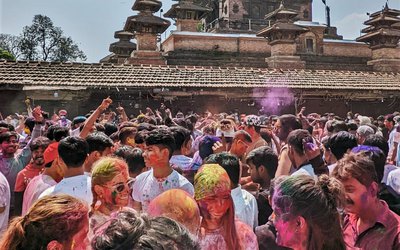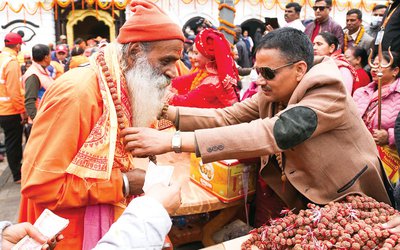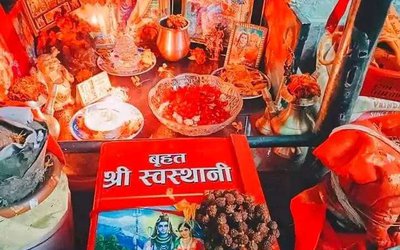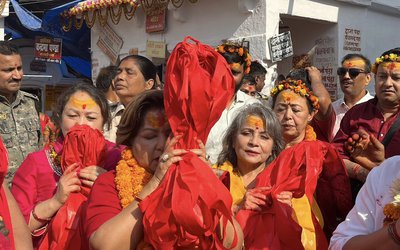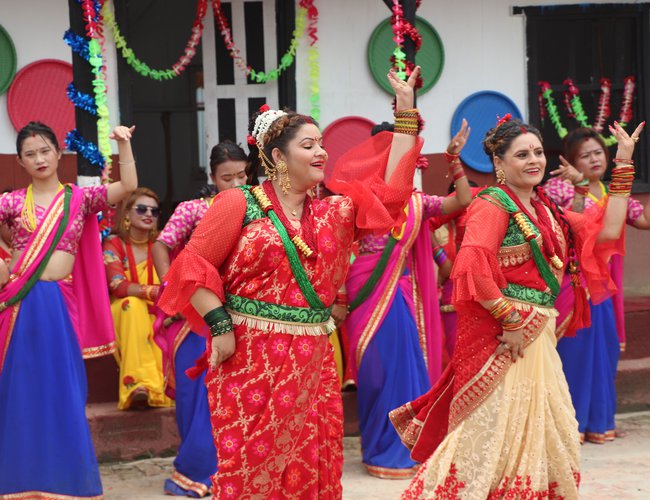
Today is the first day of Teej which is known as Dar Khane when all sisters, daughter, friends, and mothers join together for feast. The main fasting day is on 18 September and Rishi Panchami or final day is on 20.
Although the Teej celebration starts months before the Teej traditionally it is customary to eat the Dar one day bef Dar khane din is a festival celebrated one day before Hartalika Teej by the women of the Hindu Community. This festival normally lies in the month of Bhadra which is around August or September as per the English calendar.
On this day, women enjoy good food and gather in one palace to enjoy. Obviously, there will be music and dancings as well, They sing devotional songs and dance and feast. As per the culture, the men have to organize the feast and the party. So yes Dar khane din is meant for females and Yes, they do fast the next day – after eating all they can on this day before Teej.ore fasting. Dar is amidnight food consumption for the endurance to the fasting of the next day.
For centuries, the dimensions of this fast for the good of women and her family have been modernized over time. Some commercialized components and obsolete rituals are added however, the main significance and true meaning of Teej withstands the same.
It is important to consider Teej as a purely simple and important festival and to make it accessible to all, rich and poor alike.
On the other hand, there is summer season, it is necessary to take special care of health, eating too much oily food, the maximum consumption of rich and tamasi food can make you sicker, so it is important to take care of these things while eating. The notion of strict fasting even without water are fruitful, this is not true. The health of a good husband and wife for unmarried and the health of the husband and family cannot be determined not only by a single day of fasting but by a yearlong of coordination, understanding, and cooperation, dedication, and respect for each other.
Men have equal responsibility today, one needs to take responsibility for the kindness of his mothers, sisters, and wives towards him, he needs to play the role of good companions by respecting and caring for them today. As an unmarried man, do you have any idea, is someone going to fast somewhere tomorrow?
Tomorrow's fast is not only fast but also a day of dancing, talking, worshiping, and having fun. In this way, it is customary for all the women to gather together and have fun and eat sweets and delicacies in the middle of the night, this is Dar.
The anguish of the daughters who could not go to their mothers while remembering the days of eating Darr is also shed with deep tears, sometimes in song and sometimes in love.
Teej is also an enthusiasm for gender equality and gender equity. Teej can be taken as a common platform for the smiles of all-female relatives including mother, daughter, daughter-in-law, mother-in-law, mother-in-law, sister.
Today is especial day for women known s Dar khane din – a day before Teej. There are commonly consumed foods in Dar khane din. Da Khane din means “to eat” in Nepali, surely there are some foods related to this day of eating right.
As a day before the fast, women eats all kinds of vegetarian delicious food to provide energy for the next day as well. There are some good and common food in Dar khane din all over Nepal. These foods are easy to make and delicious to eat – plus they are served by the males of the society.
Khir And Puri
Khir is one of the simplest foods in Dar khane din. While you can make a fancy version of the Kheer with a Kaju, raisins, and all, the base kheer is nothing but rice pudding prepared in milk via slow cooking.
Puri is a another popular food for teej. In recent days, people eve purchase sweets of different kinds.
Alu Achar and other vegetables are widely used. In recent times, even people have started to eat chicken and mutton.
- Helvetas Nepal launches Book "Towards 70 Years of Togetherness"
- Mar 13, 2025
- Holi Festival 2025: Importance And Signficant In Nepal And India
- Mar 13, 2025
- Weather Forecast: Generally Cloudy With Rain In Hilly Areas Sudur Paschim, Karnali, Bagmati And Koshi Provinces
- Mar 13, 2025
- Foreign Minister Dr. Deuba Offers Prayers At Baidyanath Dham
- Mar 12, 2025
- KOICA Volunteer Supported Namobuddha Municipality Via Construction Of A Tourist Information Center
- Mar 12, 2025
